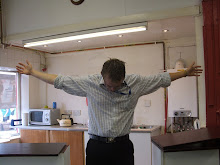As part of my research into this subject I watch Mel Gibson's version of The Passion of the Christ - on YouTube. The sound had been dubbed with a version of Amazing Grace however, the voices and sound effects were still very audible. As I sat there and watched this unbearable torture of the man by whom I live my life my eyes widened, my mouth became dry and I could hear my heart beat. I was overwhelmed. For the first time in my life, the sudden realisation of what happened to Christ on that day became apparent. Once the video had ended it took a few moments for me to gather my composure - the information I had expected to gain, ready for Period 5's class with 9SY, had been surpassed by an incredible personal gain. In the words of one of the greatest hymns ever written I pondered the question "How can it be that thou, my God, shouldst die for me?". Moreover, why did Jesus die? And, why did him dying save us from our Sins? Regularly, in Church we hear people say to us that "Jesus dying paid the penalty for our Sin. It set us free!" but I have never really understood why?
I did some research and chose books off my shelf by David Watson, Michele Guinness and other Christian authors. However, it was in the words of Nicky Gumble's book Question of Life that I found my most satisifying and simplistic answer. Allow me to share with you his words:
This image comes from a law court. Two people went through school and university together and developed a close friendship. Life went on and they went their different ways and lost contact. One went on to become a judge, while the other one went down and down and ended up a criminal. One day the criminal appeared before the judge. He had committed a crime to which he pleaded guilty. The judge recognised his old friends, and faced a dilemma. He was a judge so he had to be just; he couldn't let the man off. On the other hand, he didn't want to punish the man, because he loved him. So he told his friend that he would fine him the correct penalty for the offence. That is justice. Then he came down from his position as judge and he wrote a cheque for the amount of the fine. He gave it to his friend, saying that he would pay the penalty for him. That is love.
The first time I read this out someone raised their hand and mentioned that it was an inaccurate account as a Judge of Law would not be allowed to pass sentence for somebody he knew. However, going beyond the practical points, it does give a wonderful illustration of what it meant for Jesus to die. "Greater love has no man than this, than to lay down his life for his friends". (John 15:13) In the same way that the Judge stood down from his position and paid the cheque to his friend, Jesus laid down his life and paid the penalty for our sin.
The most touching and emotional part of the video clip, for me, came at the end and in particular in the final words of Jesus before he bowed down his head and died "Father, into your hands, I place my spirit". Whilst hanging there on the cross, with three nails through his arms and feet, having been whipped and humilated by nakedness he set aside his pain and commended himself to his Father; not with fear but with faith. Perhaps more of us need to set aside our fears and our pains of life - and commit ourselves to God.
